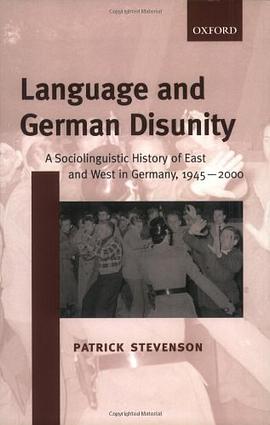

具体描述
This book investigates the history of national disunity in Germany since the end of the Second World War from a linguistic perspective: what was the role of language in the ideological conflicts of the Cold War and in the difficult process of rebuilding the German nation after 1990? In the first part of the book, Patrick Stevenson explores the ways in which the idea of 'the national language' contributed to the political tensions between the two German states and to the different social experiences of their citizens. He begins by showing how the modern linguistic conflict between east and west in Germany has its roots in a long tradition of debates on the relationship between language and national identity. He then describes the use of linguistic strategies to reinforce the development of a socialist state in the GDR and argues that they ultimately contributed to its demise. The second part considers the social and linguistic consequences of unification. The author discusses the challenges imposed on east Germans by the sudden formation of a single 'speech community' and examines how conflicting representations of easterners and westerners - for example, in personal interactions, the media, and advertising - have hindered progress towards national unity. German division and re-unification were crucial to the development of Europe in the second half of the twentieth century. This fascinating account of the relationship between language and social conflict in Germany throws new light on these events and raises important questions for the study of divided speech communities elsewhere. The book will interest sociolinguists, historians, sociologists, and political scientists.
作者简介
目录信息
读后感
评分
评分
评分
评分
用户评价
相关图书
本站所有内容均为互联网搜索引擎提供的公开搜索信息,本站不存储任何数据与内容,任何内容与数据均与本站无关,如有需要请联系相关搜索引擎包括但不限于百度,google,bing,sogou 等
© 2026 book.wenda123.org All Rights Reserved. 图书目录大全 版权所有




















